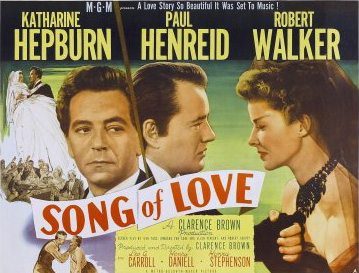
SONG OF LOVE
US, 1947, 115 minutes. Black and white.
Katharine Hepburn, Paul Henreid, Robert Walker, Henry Daniell, Leo G. Carroll.
Directed by Clarence Brown.
Robert Schumann does not seem a likely candidate for a film biography. However, over the decades many of the composers, especially in the classic era, have had films made about them including Beethoven (Copying Beethoven), Liszt (Lisztomania), Chopin (A Song to Remember), Mozart (Amadeus).
What makes Robert Schumann’s life and work as a composer more interesting is the devotion of his wife Clara. Clara Weick was a famous concert pianist who fell in love with Schumann while he was living in the family house, being tutored by her father (a very stern Leo G. Carroll). Clara continued to play the piano although she bore seven children to Schumann. Schumann himself was troubled by melancholia and spent some time in an institution. He is played with a tragic air by Paul Henreid (who had appeared in films with Bette Davis as well as with Ingrid Bergman in Casablanca). Robert Walker had been a light comedian in films for MGM at this period as well as some serious films, including the war film, Bataan. He offers a sympathetic performance as Johannes Brahms who lived with the Schumann family for many years, was in love with Clara Schumann, visited her after his European success and the death of her husband, offered to marry her. However, Clara continued playing the piano and Schumann’s work for many decades after his death.
The film was directed by Clarence Brown, a veteran of many dramas of the 1930s with Greta Garbo. At this period he had made The White Cliffs of Dover and National Velvet. Song of Love comes between The Yearling and Intruder in the Dust.
This is old-fashioned Hollywood film-making – but, of course, it is a star vehicle for Katharine Hepburn, at her peak in the 1940s. She had won an Oscar in the 1930s – and was to win three more in the 60s and 80s.
1. The popularity of biographies of composers? From Europe? From the classic period of the 19th century? The quality of this film compared with the others?
2. The title, the focus on Schumann’s Dedicatoria? The playing of it throughout the film, by Clara, by Liszt, by Schumann himself – especially in his time in the institution? The other Schumann pieces played throughout the film?
3. The focus on Schumann, as a composer, as a man, his living with the Weicki family, his love for Clara, her playing his piece in the concert, her father’s disapproval, taking Schumann to the court? Clara’s leaving her father? Marrying Schumann? Their children? Their life, living from hand to mouth? Liszt’s admiration? Schumann and his bouts of melancholia? The composition of the opera? Rejections? The manipulation of people by Liszt and Brahms? The performance of the opera? Schumann’s collapse? His time in the institution, dementia, composing pieces over again? The visits of Clara – and his death? Her grief? Cutting herself off from life, taking to her bed? Her eventual recovery? The portrait of Schumann?
4. The portrait of Clara, Katharine Hepburn and her intensity? Her skill in the piano performances? On stage, her career? The admiration of the Crown Prince and his speech? The humour of seeing the Crown Prince in 1890, remembering this story and telling it? Meeting Clara Schumann again? Clara and her defiance of her father, love for Robert? The court case and her plea? Marriage, family, her daughters and caring for them? Her continued love and devotion to Robert? During his successes, his failures? Support for the opera? Brahms in the house, the friendship, her reliance on him with the children, first meeting him when she was playing the piano? Brahms and his decision to leave, his love for her? His return after five years? Urging her to come away, taking her out, the restaurant, the violinist playing Dedicatoria? Her inability to consent to marrying him? Her life of playing her husband’s music? The final in1890?
5. Brahms, an enthusiastic young man, his compositions, playing? Schumann and his support? Inviting him into the house? His being very good with the children? His learning, his love for Clara? His help with Liszt, with the opera? His decision to leave the house, Clara’s argument against it? His success, his return, bringing Clara out of the house again, offering to marry her? Her rejection?
6. The portrait of Liszt, the celebrity, stern? His virtuoso performances? His support of Schumann in court? Playing his pieces, the Liszt variations on Dedicatoria? Schumann’s negative reaction, Clara’s negative reaction? A glimpse of Liszt?
7. The atmosphere of the period, Germany in the 19th century? The travel, the performances, royal patronage? The music world, concerts, publication? Opera?
8. An entertaining biography, done in the golden years of Hollywood style?